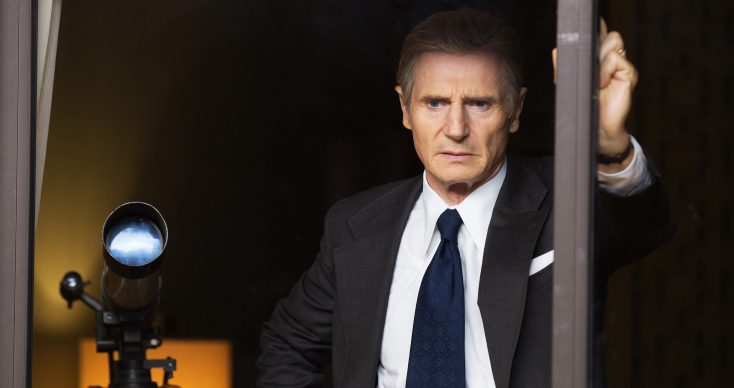
(l-r) Diane Lane as Audrey Felt and Liam Neeson as Mark Felt in MARK FELT: THE MAN WHO BROUGHT DOWN THE WHITE HOUSE. ©Sony Pictures Entertainment. CR: Bob Mahoney.
By ANGELA DAWSON
Front Row Features
HOLLYWOOD—Liam Neeson admits that while growing up in the 1960s and early 1970s in Northern Ireland, he didn’t pay that close attention to the political unrest in the U.S.
“We were going through our own hellish troubles and political upheaval,” he explains, referring to bloody fighting between those who fought for independence from English rule and those who were loyalists.
Yet, when the opportunity to portray the man who helped bring down President Richard Nixon in the Watergate debacle, Neeson couldn’t refuse.
For years, no one knew the true identity of the man who fed Washington Post reporters Carl Bernstein and Bob Woodward information that led them to expose details of the break-in into the Democratic National Committee headquarters and the subsequent cover up. They referred to their anonymous source simply as “Deep Throat.” It wasn’t until decades later, 2005, that former FBI executive Mark Felt revealed his identity in a Vanity Fair article.
Neeson (best known for his roles depicting other real-life heroes in the Oscar-winning “Schindler’s List” and “Michael Collins”) plays the dedicated G-man who spent his entire 30-year civil service career enforcing the law under J. Edgar Hoover in “Mark Felt: The Man Who Brought Down the White House.”
The drama is written, directed and produced by Peter Landesman, a former investigative journalist turned filmmaker who met Felt more than a decade ago. (Felt died in in 2008 at the age of 95.)
The tall, stoic actor spoke about tackling another real-life underappreciated hero.
Q: How did you capture the essence of Mark Felt?
Neeson: I don’t know if I did. There’s stuff written about him but there’s actually very little written about him. I employed a research assistant. There’s a lot of stuff on YouTube. That’s where I found stuff on Mark Felt. So, I relied on that a lot.
Q: Since most people don’t know what Mark Felt looked or sounded like, did you feel less concern about his appearance and more about who this man was and all the various personal crises he was going through?
Neeson: I wanted to present what Peter Landesman had written—that character. There was very little known about Mark’s relationship with his wife, with his daughter, for whom he was devoted, but she had run off to join a commune. Interestingly, Bob Woodward knew nothing of that aspect of his friend. That shows you just how much Mark Felt was able to compartmentalize his life, and he was trained to do that by (J. Edgar) Hoover and 30 years in the FBI.
In the interviews of saw of him, you thought you could see the man but there was always a screen there. As an actor, I find that interesting. There’s lots of scenes of walking down corridors and talking on telephones and talking to other guys in suits. It’s presenting that and trying to keep an audience interested. These are bureaucrats.
We shot a lot more stuff with Diane (Lane, who plays Felt’s wife, Audrey) that might end up on the DVD director’s cut. I feel saddened a little that we’ve lost some of that stuff for audiences, because as devoted as (Mark Felt) was devoted to the FBI, he was devoted to her too. She committed suicide after the whole stress; she shot herself with his service revolver. She was under enormous strain. It’s sad.
Q: Did revisiting this time period give you a better understanding of U.S. history?
Neeson: Absolutely. My research made me aware of the scale of it and how it reinforced in me—and it’s the same with growing up in Belfast—you don’t know who to believe anymore. You’ve been lied to and there’s smoke and mirrors all the time with elected leaders who claim to be representing us, and they have to be held accountable, especially when they break the law. When they think they’re above the law, as Richard Nixon felt, because he was President and whatever he said was above the law and, of course, it’s not.
Q: Did you speak with Mark’s daughter, Joan, who is depicted by Maika Monroe in the film?
Neeson: Peter Landesman did. When Felt gave his interview to Vanity Fair in 2005, that stoked Peter’s interest in the man. He went to see him. I’m sure at that point, (Felt) had some dementia. He was in his early 90s. Diane went and stayed with Felt’s daughter) Joan for 2-3 days, and learned quite a lot, so I was constantly asking Diane for information.
Q: Was there something about Mark Felt that surprised you?
Neeson: His devotion to his wife and his daughter. This compartmentalization he was able to do and his colleagues were able to do. He was just very proud of what he did and he was very proud of the Hoover legacy and what he stood for. The FBI and CIA get attacked all the time for nefarious deeds, which I’m sure they do, but I like to think that, ultimately, they’re keeping us safe, when everything’s all added up. Certainly, the FBI.
Q: Was it difficult playing a hero who sacrificed his career for the public good?
Neeson: I didn’t want to play (heroic) 100 percent. He was a very ambitious guy and I don’t think the ambition comes out as much in the script of what the guy was like. He was known around the FBI as a torpedo, meaning he would go through anything in any situation to advance himself. That’s maybe a bit harsh, but there’s never smoke without fire. I think he was very hurt that he was overlooked when Hoover died and he was not promoted to head the FBI. That really hurt him. So, I didn’t set out to play an absolute black and white hero.
The film’s heavily edited. There’s stuff that may end up in the director’s cut. I’m not saying that behind Peter (Landesman’s) back. In any film, there’s stuff that needs to be cut out. I’m surprised that some stuff that I shot with Diane that explains it a little more his situation and the stress they were under for a long time. It showed a lot more of the private man than the bureaucrat and the hero.
Q: Did you relate to him as a human being?
Neeson: When these guys are in their office, they have a screen over themselves. It’s the same with policeman and people in the military—they have to keep their emotions in check because otherwise, they wouldn’t be able to do their job. Fighting wars, arresting people, spying in people—a lot of it is very covert. They’ve been trained—sometimes at great cost to their family life—to keep all this emotion in check, but there are still beating hearts there. They’re still human beings. I hope our film shows a bit of both sides.
Q: Though set within the Watergate era, the film is very intimate, and focuses on this one man. You don’t even see an actor portraying President Nixon in this. Do you like that it was so focused or do you wish it had been broader?
Neeson: I just watched the series, “Narcos,” and I love how they blend the documentary footage with the fictional footage of the series. In an ideal world, where we would have had a bigger budget, I would have loved for our film to show (original footage) like that. There was almost a Civil War in America at that time. What was happening in Vietnam, and the protests over the Vietnam War, was incredible. At Nixon’s inauguration, thousands of people descended on Washington and protested at the White House. They had to put a ring of buses, like covered wagons, around the White House to protect the President in the White House. You had serial killers at that time—the Son of Sam, Charles Manson, the Zodiac killer, the Black Panthers, the Weather Underground, hundreds of bombs going off. So, I just wish we could have shown more of that.
Did Peter write a more intimate script? Yes, he did. Maybe if (the film’s producer) Ridley Scott had directed it, it would have been a different script and it would have been bigger (budgeted), but this is what Peter did and I think he did an extraordinary job.
I wish that for younger viewers who may go and see the film there would have been a bigger painting so they could see what was at stake and the travails the country was going through.
Q: How does Mark Felt stack up to modern day whistleblowers like Edward Snowden?
Neeson: There’s the classic question: Is he a traitor? Is he a hero? What? Certainly, the interviews I’ve seen with him in the past, there’s a legitimate argument for both. Snowden seems to think the public has to see what the government’s doing. The freedom of the press is tantamount to any free society. They have to be able to do their job. I’m not talking about gossip columnists and all that stuff but the real issues. Our elected leaders have to be held accountable.
Q: Is there a lesson from Watergate that young people can take away from this film?
Neeson: You’re a citizen of the country so you have a right and you have a right to protest. I’m not going to attack the Trump Administration—the guy has to be given his time and the Cabinet has to be given it’s time—but people are out protesting, especially women. It’s great to see people out there protesting again. That doesn’t seem to have happened for many many years. It’s like, “Yes, get in there. Get on the streets. Make your voice heard. You have a right to protest. It’s great, certainly with the women’s movement.




